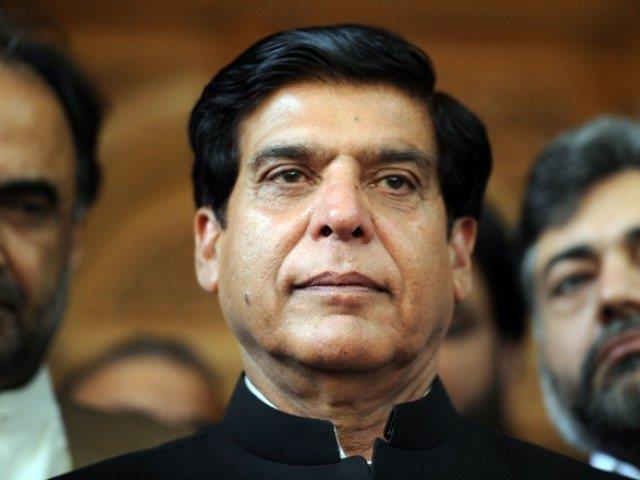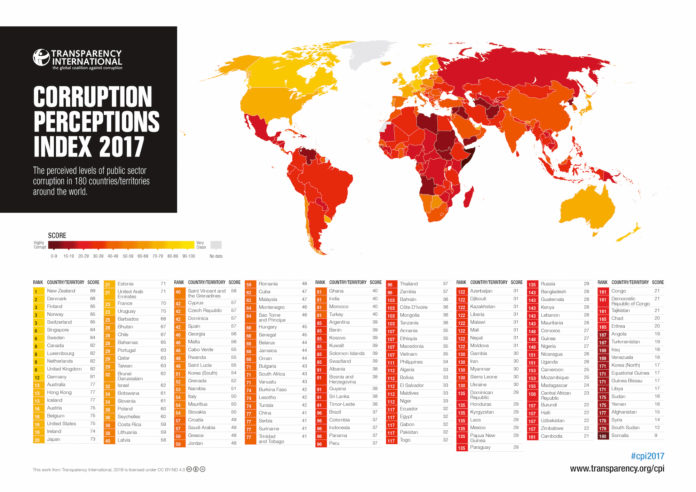When Pakistan was rated the second most corrupt country in 1996 by Transparency International (TI), a joke started that Pakistan was actually placed on the first position but the govt persuaded Tl to place Nigeria ahead of Pakistan. We may have had a good laugh then but almost twenty years (and many govts) later, Pakistan is still amongst the corrupt countries. In 2015 Pakistan was ranked 117th out of the 168 countries, no one laughed because everyone knew that corruption had become endemic, especially in the govt.
In 2015 TI said that South Asia was the most corrupt region in the world where govts failed to strengthen their anti-graft agencies. Because of political interference, anti-corruption agencies were selective in conducting investigations and fared poorly. According to a Feb 2016 survey by the Free and Fair Election Network (Fafen), a non-governmental organisation, 64% of Pakistanis believed that corruption prevailed in govt departments. With the liberalization of private television channels in 2002 operating independently, the electronic media in Pakistan was a major force in exposing corruption related cases and mega scams by the hundreds in govt departments. Some of these include the Rental Power Projects, PMDC fake registrations, Hajj corruption case, EOBI, Trade Development Authority, OGRA scam, NATO container case, Pakistan Steel Mills scam, Ephedrine quota case, etc., etc. While there are many reasons for corruption becoming a way of life, it is the lack of accountability which has allowed it to flourish with out fear of consequences. For the benefit of readers my article titled “THE KARKEY SCAM” is being reproduced.
Transparency International (TI) says Pakistan lost more than Rs.8.5 trillion (US$94 billion) in corruption, tax evasion and bad governance when the PPP- led coalition was in power from 2008 to 2013. TI observed that transparency and accountability being the two central pillars that ensure good governance, a single penny would not be asked for as aid if Pakistan could check corruption. Accepting responsibility for wrongdoing does not exist in our psyche, let alone someone being held accountable. The few heads that roll are small-time bureaucrats who make convenient scapegoats, and even they get away with the obnoxious “plea bargain” concept that allows public office holders to go free to enjoy what is remaining of what they had looted and even in most cases to loot again.
At 31 on the corruption score in 2015 on the TI scale of 0 (completely corrupt) to 100 (completely clean), Pakistan was 117 out of the 168 countries ranked. After Musharraf institutionalized corruption with his self-survival generated black NRO, Zardari the main beneficiary became President and ensured thereafter endemic corruption becoming a way of life in Pakistan. The intelligentsia is despondent at his arrival back in Karachi today after a longish self-imposed exile, photographs with his gloating grin plastered all over the streets symbolisises the farce of our democracy. With vested interest in making money as much as they can as quickly as they can, our democratic leaders do not have the political will and/or the Establishment the moral fortitude to tackle corruption forcefully or hold anyone accountable.
A list of 179 mega cases of corruption relating to financial scams, land scams and abuse of official position by public office holders was submitted to the SC by NAB. This list includes PM Mian Nawaz Sharif, Punjab CM Shahbaz Sharif, Finance Minister Ishaq Dar, ex-PM Raja Pervez Ashraf, ex-PM Shaukat Tareen, ex-PM Yousuf Raza Gillani and a host of other VVIPs belonging to both the major political parties. Whether any of the high profile accused con be convicted in the present political and judicial environment remains to be seen. During 2008-2013 NAB suffered virtual demise at the hands of President Zardari, it’s budget sloshed by almost half and its personnel was reduced by three quarters. Any surprise why he did this? NAB’s conviction rates fell abysmally when a new Chairman was brought in with the implicit understanding to go only after relatively low-ranking bureaucrats.

The most controversial cases relate to the nine Rental Power Plants (RPPs) mired by controversies and allegations of corruption, kickbacks and mismanagement. A rental services agreement was signed for 232 MW barge mounted (Karkey RPP) in 2009 to overcome 200MW – 300MW power shortage in Karachi. The then Minister of Water and Power Raja Pervez Ashraf (later PM) promised its commissioning by Nov 2009. A two-member Supreme Court (SC) Bench judgement in 2011 declared the RPP deals as non-transparent, illegal and void bonito. Huge embezzlement was evidenced in the affairs of Sharaqpur Power Plant, Karkey RPP, Reshma Rental Generation Company Limited and Gulf RPP. Finding the govt lox in overseeing the RPPs because of lucrative kickbacks, NAB was directed to proceed against the public functionaries involved including Raja Pervez Ashraf. Although the RPPs (including Karkey) remained idle for most of the 36 months of the con tract period, they continued being paid US$ 216 monthly million as rent despite electricity not being produced. The court was informed the govt did not supply fuel to make the unit fully operational. Karkey was thus producing only 30 megawatts of power, against an agreement to odd 231 MW.
As per SC directions NAB filed a reference in the respective Accountability Court in June 2014, 28 accused were arraigned. Among them was Raja Babar Ali Zulqarnain son of Raja Zulqarnain, ex-President of Azad Jammu and Kashmir (AJK). Said to be a relative of the than Pakistani PM Yusuf Raza Gilani, Raja Babar was charged with receiving kickbacks, manipulating the award of the Karkey contract and playing a key role as Karkey’s Country Representative in inflicting huge losses to the notional exchequer through his political connections. He managed to obtain protective boil by the Sindh High Court (SHC) and then by the Lahore High Court (LHC) and subsequently from the Islamabad High Court (IHC). NAB managed to get his interim boil by the IHC cancelled in Jan 2016 and he was arrested.
An open and shut case, Karkey RPP’s fate should have been decided by now, however most of the accused ore still at large without being punished. NAB’s professional expertise and determination notwithstanding, it must have political backing, support of the media and the judiciary. Named by the SC to be proceeded against on serious charges Raja Pervez Ashraf was not only spared of any punishment. Displaying sheer con tempt for the rule of low and those who adjudicate it, Zardari thumbed his nose at the SC by making him the country’s PM. Now that Raheel Shareef has retired, despite facing multiple charges of criminality Zardari feels “safe” coming back to Pakistan. For starters the honest Sindh 16 Police AD Khawaja has been removed for not following criminal dictates. Zardari may be in for a rude surprise if he thinks Qamar Bajwa will be a “three-year” pushover.
Echoing a section of the motivated media calling NAB as the facilitator, heart and brains of corruption, the remarks by the Honorable SC judge during the hearing of Raja Babar’s boil application were disappointing. With due respects and without meaning to contradict the Honorable Judge of the SC in any manner, the fact remains NAB must be given credit for performing exceedingly well in the necessary fight against corruption.
One agrees totally with the SC’s observation that “plea bargain” should not have been allowed to be used, mainly by a handful of unscrupulous and corrupt NAB officials to make money for themselves. This allows criminals to walk free and again indulge in crime, how ever the remarks about NAB and its officials will embolden criminals and demoralize the vast majority of NAB workers who are honest, dedicated and true to the cause of eradicating corruption. While prosecuting those guilty of corruption In NAB, and made on example of, one hopes that the SC will not collectively censure all the honest, hard-working NAB personnel for the crimes of a few. As one of the cornerstones of our democracy and the protector of the peoples’ (and not the criminals’) rights, liberties and freedoms, the superior judiciary is one of the lost bastions of integrity and respect left in the country.




